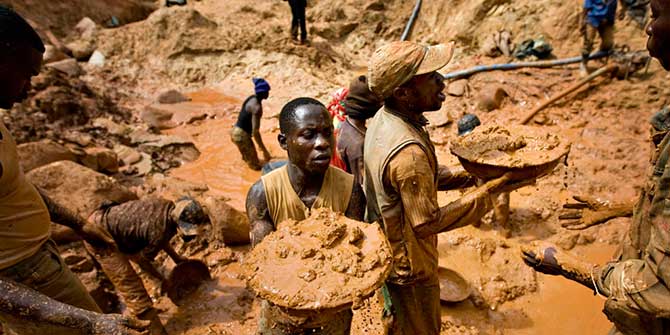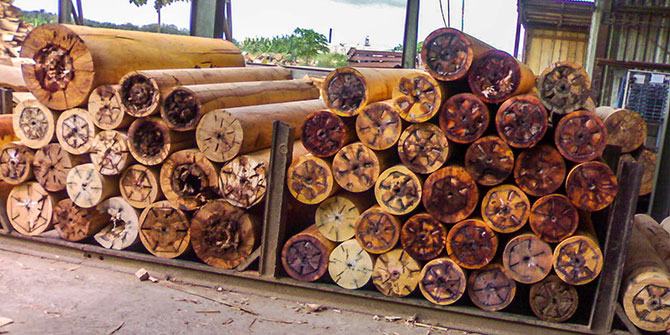As our series commemorating the first anniversary of the independence of South Sudan, LSE’s Dr Jason Hickel looks at how it can use its oil wealth to secure its future. This post was first published in the Africa Report.
South Sudan will be celebrating the first anniversary of its independence on 9 July . But the day’s revelry will be marred by the fact that the past year has brought none of the peace and prosperity that people hoped it would. With a poverty incidence of 90 percent, literacy rates as low as 24 percent, and life expectancy at a mere 42 years, South Sudan has emerged into the dawn of national independence only to find itself at the bottom of global development rankings. And things are only getting worse.

Oil is at the root of this problem. Indeed, oil has long been the source of the region’s woes. The decades-long civil war between the North and the South – which killed some 2.5 million people before the Comprehensive Peace Agreement (CPA) ended hostilities in 2005 – was fought largely over oil. The South holds 85 percent of the untapped petroleum reserves in the region and produces 75 percent of the 500,000 barrels extracted each day. Not surprisingly, the North has never been willing to relinquish control over this key resource. And this has not been just a regional battle. China has long backed Khartoum and controls the majority of the region’s oil concessions. The United States, on the other hand, has armed and funded the Sudan People’s Liberation Movement to counter-balance Khartoum’s Islamist influence in hope of gaining privileged access to the oil after independence.
Misplaced Hopes
When I met with political leaders in Juba in 2010, a year prior to independence, hopes were high that with total control over oil revenues the government would be able to spur development and reduce poverty. But it’s not likely that this will happen any time soon. Khartoum and Juba are now once again locked in conflict over the region’s oil, and have reached an impasse that threatens to leave the economies of both countries in tatters.
The CPA required that oil revenues be split evenly between the North and the South, which translated into about US$2 billion per year for each side. When the South seceded last year, the North was cut off from this flow of revenue. As a result, the North’s economy has begun to slump into recession and revenue shortfalls have forced the government to adopt extreme austerity measures that are already sowing popular discontent.
Khartoum, which controls the Greater Nile Pipeline and the only route that connects the oil to international markets, has reacted by forcing Juba to pay user fees of US$36 per barrel (a whopping 10 times the international average), in hope of recouping some of its massive financial losses. Juba, for its part, refuses to pay more than US$1 per barrel. After negotiations over this issue broke down in January, Sudan president Omar al-Bashir ordered the seizure of an oil shipment from the South worth US$800 million. In turn, South Sudan’s president Salva Kiir played his only hand and shut down oil production altogether.
Given that oil revenue accounts for 71 percent of South Sudan’s GDP and 98 percent of the government’s annual budget, the oil shutdown has brought the country to the brink of crisis. As the World Bank warned in a recent leaked memo, the government’s move is likely to contract the economy, spur inflation, deplete foreign currency reserves, and exacerbate the poverty of an already ravaged population. But Juba doesn’t have much of a choice. An alternative pipeline through to the Kenyan coast – which has been under discussion for some time – would require substantial foreign investment and could take 3 to 4 years to build. To keep afloat, South Sudan is now mortgaging its untapped oil to China and Qatar in return for aid.
But even if South Sudan did control all of its oil, there’s no guarantee that development would follow. In fact, if history is any guide, quite the opposite is true: regions with an abundance of non-renewable sub-surface resources – like Nigeria, Chad, Angola, and Gabon – nearly always experience worse development outcomes and slower economic growth than countries with fewer such resources.
Economists call this the “resource curse.” Overreliance on oil exports makes imports cheap to the point of undercutting local producers and crippling economic diversification – a scenario known as the “Dutch Disease.” In addition, when states rely on rents instead of taxes for the bulk of their revenue, the social contract of accountability between government and citizens gradually erodes, and administrators have no incentive to invest in human resources, encourage industry, or promote the development of a middle class that would provide a sustainable tax base. Such states tend to become heavily repressive: oil-producing countries spend many times more on military force than their non-oil-producing counterparts.
The environmental costs of oil exploitation in South Sudan constitute another dimension of the resource curse. Bordering the Sahara desert, South Sudan is disproportionately vulnerable to the risks associated with climate change. Rapid desertification has already forced mass migrations across the west of the country over the past few decades, which has led to starvation, violence, and considerable social upheaval.
Preventing the Resource Curse
None of this is inevitable. The best way to prevent the resource curse would be for South Sudan to follow the example of Ecuador’s Yasuni ITT initiative, whereby Ecuador promises to keep its oil in the soil and thereby protect its rainforests in exchange for 50 percent of the income – in the form of donations from around the world – that the state will forgo as a result. South Sudan could accomplish this by trading on the high levels of global sympathy attached to its status as the world’s newest – and poorest – country. Given the costs associated with the resource curse and climate change, this option would work out to be significantly better for the country’s economy.
Given that a Yasuni-style bargain is unlikely in the political climate of South Sudan right now, the next best thing would be to introduce a smart Petroleum Bill that would prevent the resource curse and leverage oil wealth for poverty alleviation and sustainable development. In a chapter I wrote for a new book on the matter, I show that the US State of Alaska offers a model for how this can be done.
The Alaska constitution declares all natural resources to be owned in common. When oil was discovered in the 1970s, the state established a “Permanent Fund” designed to provide a sustainable source of investment revenue to last until long after the oil is gone. A portion of the earnings from the Fund is distributed directly to Alaska residents in the form of a personal dividend. This ensures that every Alaskan benefits directly from the exploitation of common resources, and supplies each resident with a partial basic income guarantee. This strategy has helped Alaska forestall the resource curse by generating a powerful social contract between government and residents. Since residents rely on the dividend, they have a stake in responsible resource management; no politician can get away with mismanaging revenues without voter backlash.
This strategy could be usefully implemented in South Sudan, which has begun life with an absolute absence of social contract and no history of democratic accountability: the most direct predictors of the resource curse. It could also help transform the way that the South Sudanese think about common resources. Oil companies presently enjoy total tax exemption, meaning that they get to take the country’s crude oil for free (though they give part of it back to the government in accordance with “production sharing agreements”). The same is true of the land and water in oil areas. Following the basest dictates of neoliberal economics, the government essentially gives away the commons for multinational corporations to exploit at will, without any return to the citizens to whom those commons belong.
South Sudan’s reserves are estimated at 5 billion barrels, which – assuming today’s rates of extraction – will last about 36 years. At current prices, this means as much as $4 billion per year in oil revenues in the near term – $2 billion windfall over pre-independence incomes. Following the Alaska model, South Sudan could put $1 billion per year into a Permanent Fund. At this rate, after 36 years the principal could be around $60 billion, 50 percent bigger than Alaska’s after a comparable period. This investment would ensure that future generations benefit from today’s ephemeral oil wealth.
Just Give Money to the Poor
In addition, the state could distribute $1 billion per year as personal dividends to every citizen, and then tax that income back at 40 percent. That would mean $145 per adult per year after taxes, or around 25 percent of average household income.
This would have a number of benefits. First, it would give citizens a stake in the management of resources and revenues. Second, it would foster a sense of accountability between government and citizens, manufacturing a social contract from scratch. Third, it would increase income tax receipts from their present level of 1 percent to over 17 percent of the existing budget, which approximates the proportion that economists consider necessary to avoid the rentier trap. Fourth, the government would have to justify its taxes by providing public services such as healthcare and education. Finally, it would stimulate local economies and provide a partial basic income guarantee that would dramatically reduce poverty and inequality, as it has in Alaska.
Economists Hanlon, Barrientos and Hulme demonstrate the efficacy of direct cash transfers as a poverty-reduction strategy in their recent book Just Give Money to the Poor: The Development Revolution from the Global South. Using data from China, Brazil, South Africa, and others, they show that basic income grants attack poverty more efficiently than most NGO and state-led programmes, and without the moralising bureaucracy.
These measures would empower communities to assert ownership of the commons and prevent oil companies from thinking that they are free to take resources that appear to be unowned, such as subsurface minerals, land, and water. As collective owners of the commons, communities should demand compensation for the use of their environment as a basic cost of doing business.
Funding the Permanent Fund and direct distribution together would require only 40 percent of total annual oil revenues. The other 60 percent could go into the state budget, with earmarks for “priority sectors” (such as education, health, and infrastructure) and to fund economic diversification. Using oil money to subsidise more sustainable sectors like manufacturing and small-scale agriculture would prevent the Dutch Disease, create widespread local employment (which the oil industry does not), and wean the state away from its dependence on rents to rely instead on taxes paid by a growing middle class. The ultimate goal should be to phase out the petroleum industry altogether, transmuting oil wealth as quickly as possible into the basis of a more sustainable and environmentally friendly economy.
If these policies are to be put in place in South Sudan, it must happen very soon. During my visit to Juba a number of politicians told me that the government was overwhelmed with oil industry lobbyists – mostly from China– and western organisations such as USAID jockeying for influence over concession distribution and petroleum-related legislation, which has not yet been drafted. If South Sudan does not act decisively in defense of the commons now, it may never be able to change course.





